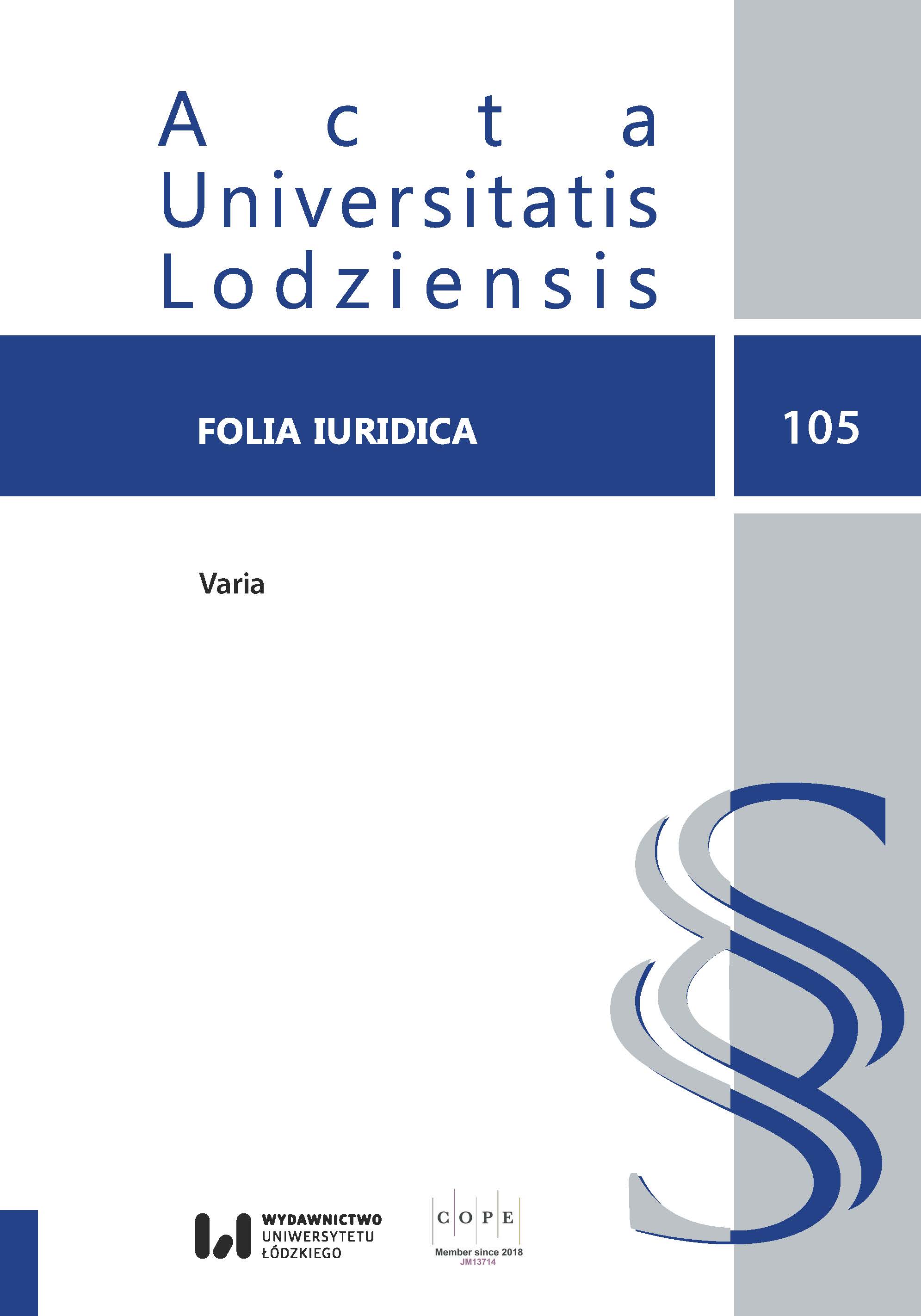Autonomia i wolność – korelacja pojęć w doktrynach polityczno-prawnych
DOI:
https://doi.org/10.18778/0208-6069.105.13Słowa kluczowe:
autonomia, wolność, koncepcja wolności pozytywnej i negatywnej, doktryny polityczno-prawneAbstrakt
Celem artykułu jest przedstawienie relacji znaczeniowych zachodzących pomiędzy pojęciem autonomii i wolności na gruncie doktryn polityczno-prawnych. Przeprowadzona analiza służy wykazaniu, że pojęcie autonomii ma węższe znaczenie, zawierające się w szerszej kategorii, jaką jest wolność. O ile pojęcie autonomii nie jest tożsame z negatywnym ujęciem wolności, sprowadzającym się do posiadania jak najszerszego spektrum alternatyw możliwego wyboru zachowania, to wyraża się ono w koncepcji wolności pozytywnej, czyli w zasadzie samodzielnego kierowania własnym postępowaniem. Obydwa pojęcia zostały badane wyłącznie w kontekście postrzegania ich jako atrybutu człowieka. Metodyka prowadzonej analizy opiera się głównie na koncepcjach Isaiaha Berlina, Geralda C. MacCalluma Jr. oraz Geralda Dworkina. W artykule poruszono także rozumienie pojęcia autonomii w wybranych wyrokach Europejskiego Trybunału Praw Człowieka.
Pobrania
Bibliografia
Berlin, Isaiah. 2017. Wolność. Warszawa: Wydawnictwo Aletheia.
Google Scholar
Blicharz, Jolanta. 2011. „Dyskusje na temat znaczenia autonomii. Jednostki (osoby) jako wartości aksjologicznej”. Przegląd Prawa i Administracji 87: 11–19.
Google Scholar
Błachut, Michał. 2003. „Autonomia podmiotu a neutralność moralna prawa”. W Z zagadnień teorii i filozofii prawa. Autonomia prawa ze stanowiska teorii i filozofii prawa. Red. Joanna Helios. 41–58. Wrocław: Wydawnictwo Uniwersytetu Wrocławskiego.
Google Scholar
Branka, Tomasz. 2018. „Treść i zakres pojęcia «autonomia». Wyzwania definicyjne”. Acta Politica Polonica 3(45): 5–17. https://doi.org/10.18276/ap.2018.45-01
Google Scholar
Chmieliński, Maciej. 2004. Atomizm a indywidualizm. Rozważania nad myślą polityczną i prawną Wilhelma von Humboldta. Łódź: Wydawnictwo Uniwersytetu Łódzkiego.
Google Scholar
Darwall, Stephen. 2006. „The Value of Autonomy and Autonomy of the Will”. Ethics 116(2): 263–284. https://doi.org/10.1086/498461
Google Scholar
Dryla, Olga. 2012. „Prawo do niewiedzy a autonomia”. Diametros 32: 19–36.
Google Scholar
Dworkin, Gerald. 1976. „Autonomy and Behavior Control”. The Hastings Center Report 6(1): 23–28. https://doi.org/10.2307/3560358
Google Scholar
Dworkin, Gerald. 1988. The Theory and Practice of Autonomy. Cambridge: Cambridge University Press. https://doi.org/10.1017/CBO9780511625206
Google Scholar
Dworkin, Gerald. 2002. „Autonomia”. W Przewodnik po współczesnej filozofii politycznej. Red. Robert E. Goodin, Philip Pettit. 463–471. Warszawa: Wydawnictwo „Książka i Wiedza”.
Google Scholar
Gajda-Krynicka, Janina. 2019. „Paradoks wolności w filozofii stoickiej”. W Wolność człowieka i jej granice. Antologia pojęcia w doktrynach polityczno-prawnych. Od Starożytności do Monteskiusza. Red. Olgierd Górecki. 67–98. Łódź: Wydawnictwo Uniwersytetu Łódzkiego. https://doi.org/10.18778/8142-180-5.04
Google Scholar
Górecki, Olgierd. 2013. Obrona państwa ograniczonego. Polityczno-prawna doktryna Herberta Spencera. Kraków: Wydawnictwo Akademicka.
Google Scholar
Górecki, Olgierd. 2016. „Wolność człowieka – doktrynalna analiza pojęcia normatywnego zawartego w Konstytucji Rzeczypospolitej Polskiej z 2 kwietnia 1997 r.”. W Zagadnienia prawa konstytucyjnego. Polskie i zagraniczne rozwiązania ustrojowe. Red. Krzysztof Skotnicki, Konrad Składowski, Anna Michalak. 117–140. Łódź: Wydawnictwo Uniwersytetu Łódzkiego. https://doi.org/10.18778/7969-841-7.11
Google Scholar
Górecki, Olgierd. 2022. „Freedom According to the Views of Aristotle of Stagira: Analysis of Its Doctrinal Category Using Gerald MacCallum’s Extended Formula of Freedom”. Studia Iuridica Lublinensia 31(3): 105–122. https://doi.org/10.17951/sil.2022.31.3.105-122
Google Scholar
Haworth, Lawrence. 1984. „Autonomy and Utility”. Ethics 95(1): 5–19. https://doi.org/10.1086/292594
Google Scholar
Kaczmarczyk, Michał Roch. 2019. Aporia wolności. Toruń: Wydawnictwo Naukowe Uniwersytetu Mikołaja Kopernika.
Google Scholar
Kant, Immanuel. 2001. Uzasadnienie metafizyki moralności. Kęty: Wydawnictwo Antyk.
Google Scholar
Korzeniewski, Bartosz. 2006. Polityczne rytuały pokuty w perspektywie zagadnienia autonomii jednostki. Poznań: Wydawnictwo Poznańskie.
Google Scholar
Lorenc, Włodzimierz. 2017. „Autonomia ludzkiego istnienia a autonomia filozofii”. W Przestrzenie autonomii – sztuka, filozofia, kultura. Red. Teresa Pękala. 39–54. Lublin: Wydawnictwo Uniwersytetu Marii Curie-Skłodowskiej.
Google Scholar
MacCallum, Gerald C. Jr. 1967. „Negative and Positive Freedom”. Philosophical Review 76(3): 312–334. https://doi.org/10.2307/2183622
Google Scholar
Makowski, Piotr. 2006. „Autonomia w etyce I. Kanta (próba interpretacji historycznej)”. Diametros 10: 34–64.
Google Scholar
Mana-Walasek, Sabrina. 2016. „Korelacja autonomii jednostki z wolnością w świetle orzecznictwa Europejskiego Trybunału Praw Człowieka”. Przegląd Prawniczy Uniwersytetu Warszawskiego 15(2): 461–478.
Google Scholar
May, Thomas. 1994. „The Concept of Autonomy”. American Philosophical Quarterly 31(2): 133– 144.
Google Scholar
Mędrzecki, Włodzimierz. 2011. „Jednostka – społeczeństwo – państwo w XX wieku”. W Autonomia jednostki w Europie i w Polsce od XVII do XX wieku. Red. Włodzimierz Mędrzecki. 83–102. Warszawa: Instytut Historii PAN.
Google Scholar
Piper, Mark. 2016. „Achieving Autonomy”. Social Theory and Practice 42(4): 767–792. https://doi.org/10.5840/soctheorpract201642427
Google Scholar
Rau, Zbigniew. 2000. Liberalizm. Zarys myśli politycznej XIX i XX w. Warszawa: Aletheia.
Google Scholar
Rawls, John. 1980. „Kantian Constructivism in Moral Theory”. The Journal of Philosophy 77(9): 515–572. https://doi.org/10.2307/2025790
Google Scholar
Rawls, John. 2009. Teoria sprawiedliwości. Warszawa: Wydawnictwo Naukowe PWN.
Google Scholar
Raz, Joseph. 1986. The Morality of Freedom. Oxford: Oxford University Press.
Google Scholar
Rupniewski, Michał. 2015. Prawo jako narzędzie sprawiedliwej kooperacji w społeczeństwie demokratycznym. Filozofia polityczna Johna Rawlsa z perspektywy prawniczej. Łódź: Wydawnictwo Uniwersytetu Łódzkiego. https://doi.org/10.18778/7969-566-9
Google Scholar
Schneewind, Jerome Borges. 1998. The Invention of Autonomy. Cambridge: Cambridge University Press.
Google Scholar
Swaine, Lucas. 2016. „The Origins of Autonomy”. History of Political Thought 37(2): 216–237.
Google Scholar
Urbańczyk, Michał. 2019. „Powinności wolności. John Stuart Mill i jego koncepcja wolności społecznej/obywatelskiej”. W Wolność człowieka i jej granice. Antologia pojęcia w doktrynach polityczno-prawnych. Od Nietzschego do współczesności. Red. Olgierd Górecki. Łódź: Wydawnictwo Uniwersytetu Łódzkiego. https://doi.org/10.18778/8142-186-7.16
Google Scholar
Wyrok ETPC z 29.04.2002 r., Pretty v. Wielka Brytania, 2346/02, HUDOC.
Google Scholar
Wyrok ETPC z 1.07.2002 r., I. v. Wielka Brytania, 25680/94, HUDOC.
Google Scholar
Wyrok ETPC z 10.04.2007 r., Evans v. Wielka Brytania, 6339/05, HUDOC.
Google Scholar
Wyrok ETPC z 12.01.2010 r., Gillan i Quinton v. Wielka Brytania, 4158/05, HUDOC.
Google Scholar
Wyrok ETPC z 6.10.2010 r., Świadkowie Jehowy w Moskwie i inni v. Russia, 302/02, HUDOC.
Google Scholar
Opublikowane
Wersje
- 2024-02-15 - (2)
- 2023-12-22 - (1)
Jak cytować
Numer
Dział
Licencja

Utwór dostępny jest na licencji Creative Commons Uznanie autorstwa – Użycie niekomercyjne – Bez utworów zależnych 4.0 Międzynarodowe.














